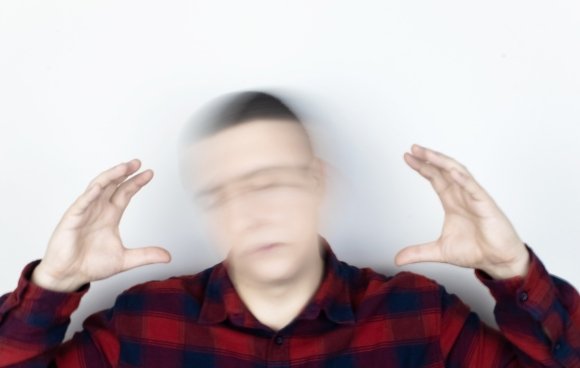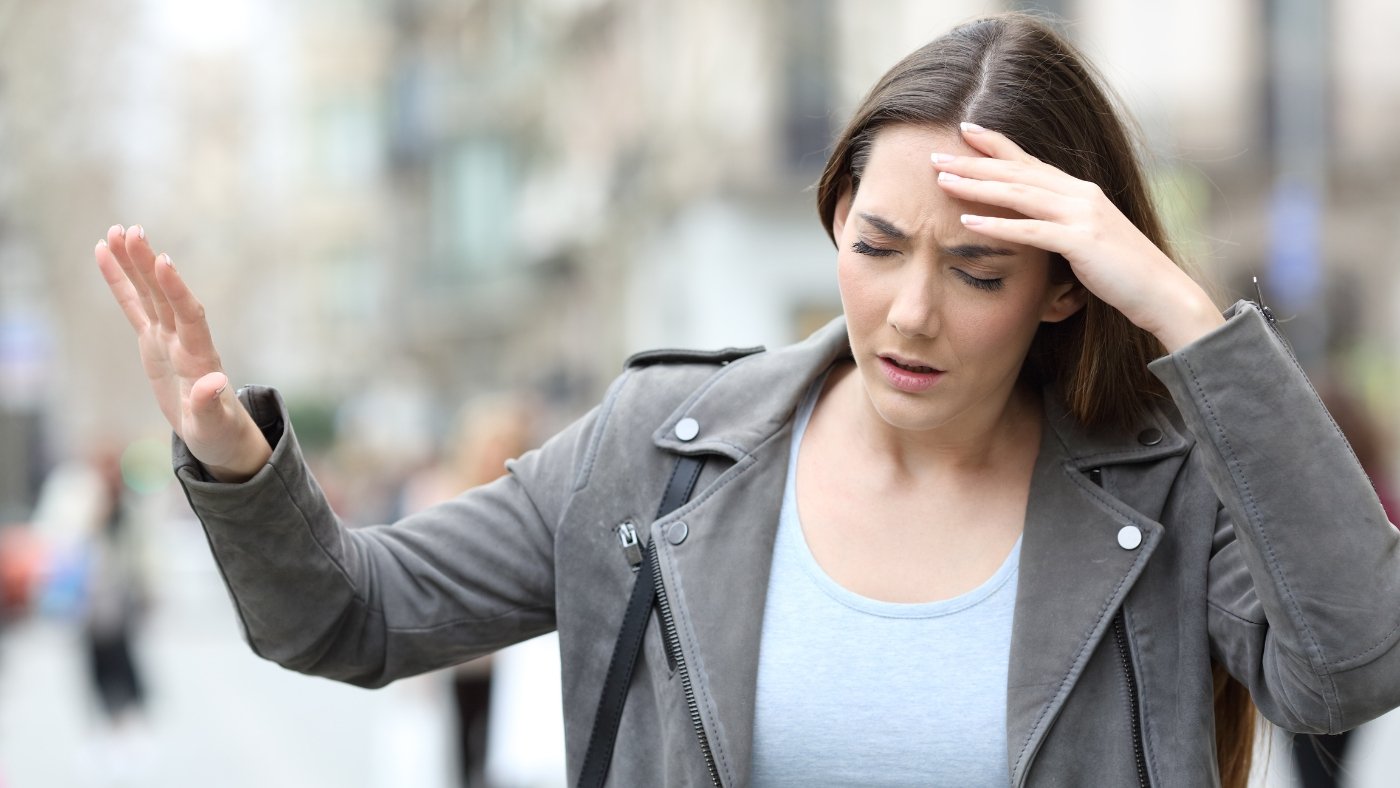Have you ever stood up too quickly and suddenly felt so dizzy that you had to grab a wall or sit down?
It's actually quite common to feel a little dizzy when you stand up. This sensation is usually caused by orthostatic or postural hypotension, a specific type of low blood pressure associated with a change in your posture.
However, dizziness that lasts more than a few seconds can be a sign of a more serious cause.
What causes dizziness?

You stood up too fast
It takes extra effort for your heart to pump blood through your body when you stand up compared to when you're lying down.
In fact, blood pressure naturally fluctuates depending on your position, which is how your body works to maintain homeostasis, a state of balance that allows many of your body's systems to function properly.
When your body gets used to operating in a certain position, changing positions can surprise your system by temporarily reducing blood flow to the brain.
Gravity causes the blood to pool briefly in the lower body when you stand up, it may take a few seconds or even a minute for your body to adjust. While your blood continues to circulate throughout your body, your blood pressure can fluctuate and cause dizziness.
Note: If you've spent more time lying down lately, you're likely to feel dizzy when you stand up, as your body needs time to adjust to getting up and moving around more often.
What to do if you usually feel lightheaded when you stand up. These tips may help:
- Move gradually, lifting your head, shoulders, then sit or stand up easily.
- It may help to sit on the edge of the bed for a few minutes before getting up. Give your body time to adjust, especially in the morning when blood pressure is at its lowest.
- Wear compression socks to increase blood circulation in your legs.
- Sleep with the head of the bed elevated or try a wedge pillow that allows you to bend at the waist.
- Drink 2 glasses of water 20-30 minutes before getting out of bed or if you have been standing for a very long time.
- Avoid standing for a long time to prevent blood pooling in your feet and swelling.
- Keep notes of when you feel dizzy to pinpoint possible causes.
It is best to be extra careful after bed rest due to injury, illness or pregnancy. Move slowly and rest as much as necessary with sudden movements.
Overheating and dehydration
If you don't drink enough water, especially when it's hot outside, you can easily overheat and become dehydrated. When the ambient temperature rises, your blood pressure naturally drops, which causes dizziness.
Dehydration itself can also affect your body's ability to regulate temperature – when you're dehydrated, you sweat less, making it harder for your body to cool down. Less water in your body means less water in your blood, so your blood pressure can go up or down.
In the short term, dehydration can cause a decrease in blood volume and blood pressure. However, over time, dehydration can lead to high blood pressure as the brain constricts blood vessels.
What to do next: Hydration can help regulate blood pressure and reduce dizziness. Try these tips:
- Every day drink enough water: Experts recommend consuming about 11.5 cups for women and 15.5 cups for men. Just know that about 20% of this water comes from the food you eat.
- Drink more water during exercise or in very warm weather.
- Try adding a cup or two of water every day electrolytes solutions, e.g. Trace Minerals Drops, to keep your body hydrated and replenished with important elements.
-
Sale Product on saleTrace Minerals ConcenTrace liquid marine mineral complex, 118 ml
39,90 €Original price was: 39,90 €.27,90 €Current price is: 27,90 €.Rated 4.75 out of 5 based on 4 customer ratings
Heart problems
Some heart conditions that can cause low blood pressure include a very slow heart rate (bradycardia), heart valve problems, heart attack, and heart failure. These conditions prevent the body from pumping more blood quickly when standing up.
Endocrine problems
Thyroid disease, adrenal insufficiency (Addison's disease), and low blood sugar (hypoglycemia) can cause orthostatic hypotension. So can diabetes, which can damage the nerves that help send signals that regulate blood pressure.
Disorders of the nervous system
Some nervous system disorders, such as Parkinson's disease, multiple system atrophy, Lewy body dementia, pure autonomic failure, and amyloidosis, can disrupt the body's ability to control blood pressure.
Alcohol consumption
Alcohol can damage and narrow your blood vessels, reducing blood flow and forcing your body to regulate blood pressure. Therefore, after standing up after drinking a few drinks, you may feel a little dizzy.
This vertigo, often called "spinning," occurs because alcohol consumption can change the density of fluid in the ear canals, causing dizziness.
Since a sudden change in position already affects blood pressure, drinking alcohol can make you even more dizzy when you stand up.
What to do next: You can try drinking coffee, eating something - but often you just have to wait for the feeling to go away.
To avoid future "swirls", try not to drink alcohol on an empty stomach, as this can worsen its effects on your body. Reducing the amount of alcohol you drink or avoiding it altogether can help prevent dizziness and long-term side effects.
Quick tip: A health professional can help you develop a personal plan to safely reduce your alcohol consumption. Tell them about any symptoms you notice, such as feeling dizzy when you stand up. They may recommend gradually reducing the amount of alcohol you drink or increasing the time between drinks at one sitting.
Intense sport
When you exercise, your muscles encourage blood flow to your heart. When you rest, your blood tends to return to your extremities. This rush of blood, combined with the strain on your lungs, means you may feel a little light-headed when you stand up or move around after a workout.
Particularly extreme or vigorous exercise can lower blood pressure and cause dizziness when standing or changing positions. Examples of vigorous exercise include:
- Fast running
- Cycling Sports
- Weightlifting
- Swimming
What to do next: If you're feeling dizzy, nauseous, or have blurry vision after a workout, this might help:
- Take a few minutes to sit down to lower your heart rate.
- Do not rush to take a shower, because increasing the temperature in the environment can lower your blood pressure even more.
- Do exercises that don't require you to change positions often, especially if you have low blood pressure.
- Drink plenty of water before and during exercise.
Medication use
Some medications can cause dizziness when standing up because they change blood pressure. Examples:
- Medicines that specifically affect blood pressure, such as diuretics, beta-blockers or ACE inhibitors.
- Medicines that can cause low blood pressure as a side effect, such as Prozac.
- Medicines to treat urinary retention, such as tamsulosin (Flomax).
- Benzodiazepines such as diazepam (Valium) or alprazolam (Xanax).
- Certain antidepressants, such as tricyclic antidepressants or monoamine oxidase inhibitors (MAOIs).
What to do next: If you think your dizziness when standing up may be related to the medication you're taking, see your doctor right away, but keep taking it until your doctor says you can stop. Abrupt discontinuation of prescribed medication can have serious health consequences.
Postural Orthostatic Tachycardia Syndrome (LOTS)
LOTS is a more severe form of orthostatic intolerance, a condition where you may have difficulty standing and feel faint or dizzy all the time.
If you have LOTS, your body can't automatically regulate your blood pressure, so changes in posture can cause prolonged dizziness.
Other symptoms of LOTS include:
- Heart palpitations
- Shortness of breath
- Headaches
- Trembling or sweating
- It's hard to sleep
What to do next: If you notice these symptoms, it's best to make an appointment with your doctor as soon as possible. They can offer more guidance on how to identify the root cause.
In the meantime, you can take steps to reduce your symptoms:
- Drink enough water.
- Avoid standing for too long at a time, especially in one position.
- Eat small portions, often.
- Add more sodium to your diet.
- Try to stick to a regular sleep schedule.
- When sleeping, use a wedge pillow or, if possible, a packable headboard.
- Before sitting or standing up, do isometric exercises that involve tensing and relaxing the muscles.
Quick tip: By consistently taking your blood pressure and heart rate at the same time every day, you can track your baseline blood pressure and monitor changes.
Health disorders
Some medical conditions unrelated to blood pressure, such as gastrointestinal problems, inner ear problems, and hormonal changes, can cause dizziness and lightheadedness upon standing.
Other medical conditions can cause dizziness when standing up because of a drop in blood pressure. Examples of these terms are:
- Heart problems
- Thyroid diseases such as hypothyroidism
- Diabetes
- Neurological conditions such as dementia and Parkinson's disease
- Anemia
What to do next: The best treatment will depend on your underlying medical condition.
For example, managing stress levels and practicing calming techniques such as meditation can help reduce nausea and dizziness caused by gastrointestinal problems, inner ear problems, and hormonal changes.
If you think your vertigo is related to inner ear problems, on the other hand, your doctor or an ear, nose, and throat (ENT) specialist can help you make a diagnosis and explain treatment options.
A doctor can always offer more help by pinpointing the cause and possible treatment for any associated symptoms.
Orthostatic hypotension (low blood pressure) risk factors
Age. Orthostatic hypotension is common in people 65 years and older. Special cells (baroreceptors) near the arteries of the heart and neck that control blood pressure can slow down as we age. An aging heart may also have a harder time reducing blood pressure.
Medicines. These are medicines used to treat high blood pressure or heart disease, such as diuretics, alpha blockers, beta blockers, calcium channel blockers, angiotensin converting enzyme (ACE) inhibitors and nitrates.
Other medications that may increase the risk of orthostatic hypotension include medications used to treat Parkinson's disease, certain antidepressants, certain antipsychotic medications, muscle relaxants, erectile dysfunction medications, and narcotics.
Certain diseases. Conditions that can increase the risk of low blood pressure include certain heart conditions, such as heart valve problems, heart attack, and heart failure. They also include certain disorders of the nervous system, such as Parkinson's disease. This includes diseases that cause nerve damage (neuropathy), such as diabetes.
Effect of heat. Being in a hot environment can cause profuse sweating and possibly dehydration, which can lower blood pressure and cause orthostatic hypotension.
Rest. Prolonged bed rest due to illness or injury can cause weakness. This can cause orthostatic hypotension.
Alcohol. Alcohol consumption may increase the risk of orthostatic hypotension.
When to seek medical help?

If standing vertigo makes you feel anxious when you change your body position, or if it starts to significantly affect your health or daily routine, the next good step is to see your doctor.
Although short-term dizziness should not be a cause for concern, some signs that may indicate more serious causes of orthostatic hypotension include:
- Fainting or loss of consciousness
- Falling or not being able to stand without support
- Headaches
- Decreased blood sugar or hypoglycemia
To help determine the cause of dizziness, your doctor may:
- Check your blood pressure while lying down, standing up, and sitting up.
- Recommend a tilt table test to help determine the cause of the vertigo. During this test, your vital signs will be monitored while strapped securely to a table that moves you from a horizontal to an upright position.
- Adjust any medications you are taking that may affect your blood pressure.
- Recommend keeping a journal of when you feel dizzy to help identify possible triggers.
To prevent dizziness in the future, your doctor may recommend:
- Drink plenty of water.
- Eat a balanced diet rich in fruits, vegetables and whole grains.
- Monitor your blood sugar.
- Get regular physical activity through moderate activity, such as walking, cycling or dancing, for at least 15 minutes a day.
If you ever feel lightheaded (even momentarily) or faint when you stand up, tell your doctor right away. If necessary, medications can be prescribed to treat orthostatic hypotension. But try the easy stuff first.
Dizziness can often be caused by small things, and often making small changes to a few things will improve it.












